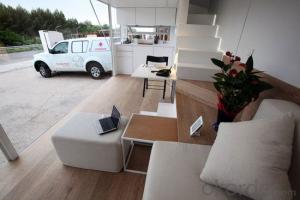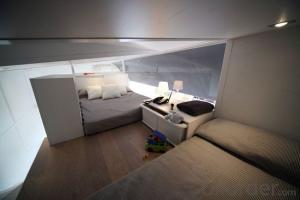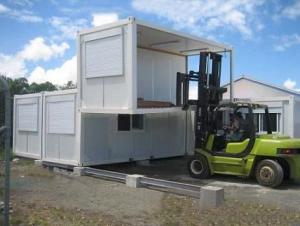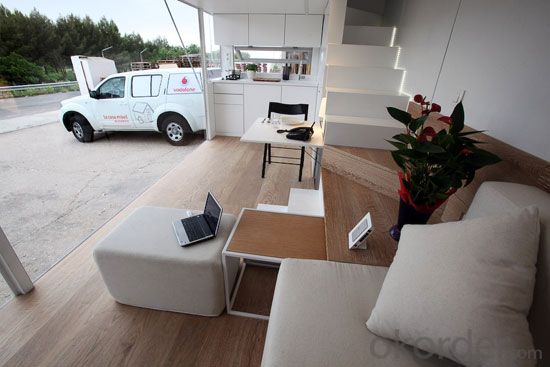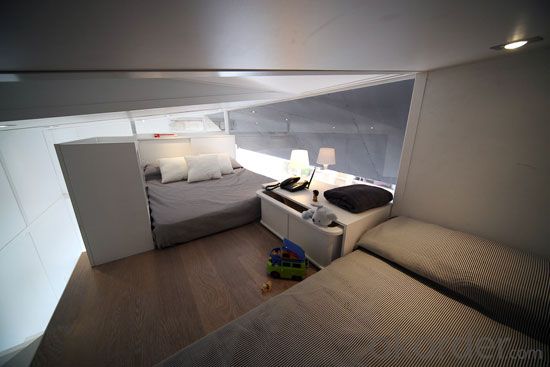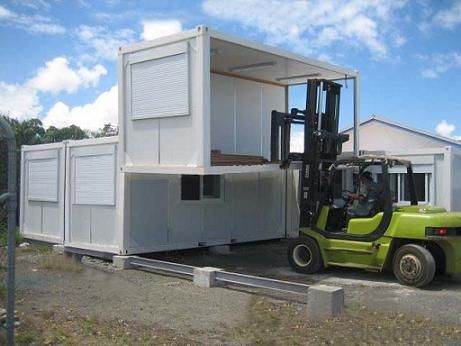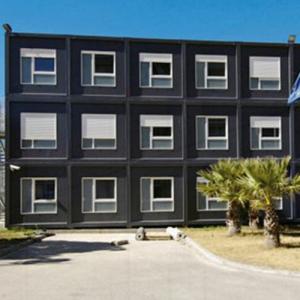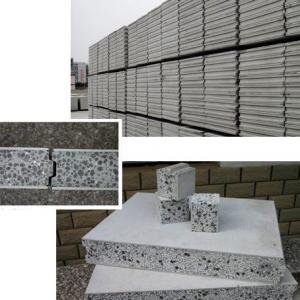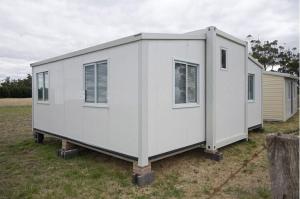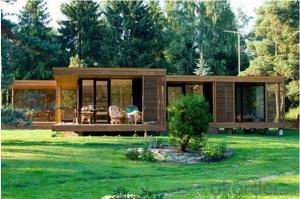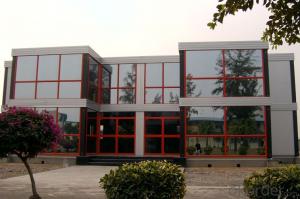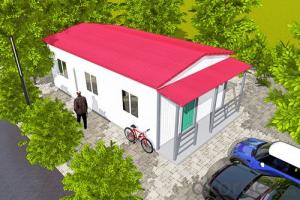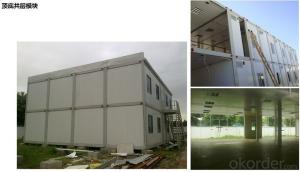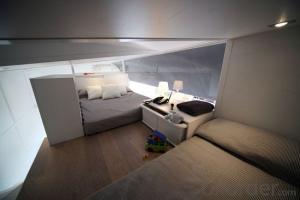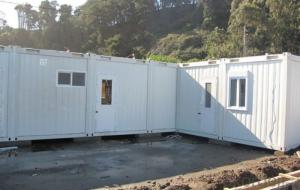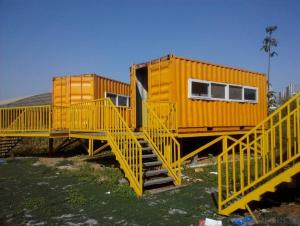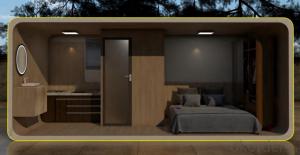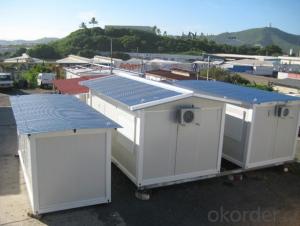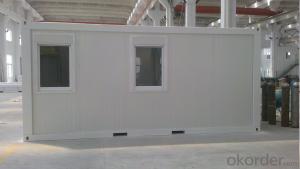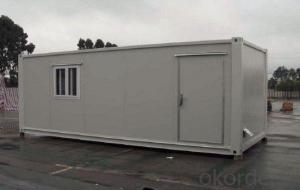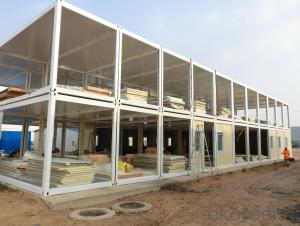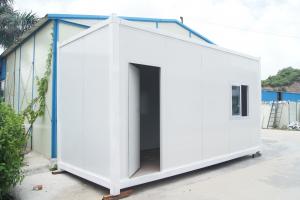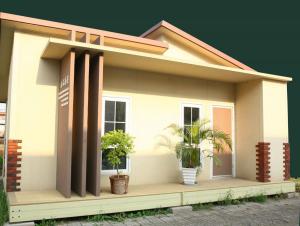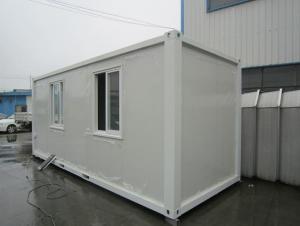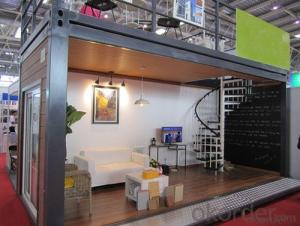Container House, Mobile Container house,prefabricated houses
- Loading Port:
- Shanghai
- Payment Terms:
- TT OR LC
- Min Order Qty:
- 4 set
- Supply Capability:
- 200 set/month
OKorder Service Pledge
OKorder Financial Service
You Might Also Like
Specification
Container House
Easy Transportation, Fast Construction, Flexible Combination, Cost Saving, Green&Sustainable
The units are suitable for:
• Accommodation units • Office / Hotel • Large Camps
• Temporary Housing • Exhibitions • Construction sites
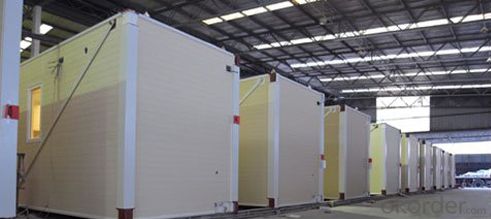
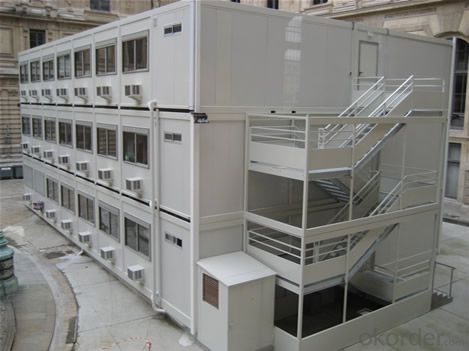
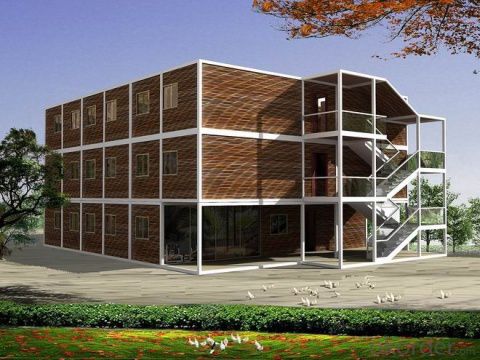
1. The benefits of Container House
Perfect for modular/prefab site offices,cabins,warehouse,villa,toliet,shop,hotel,camp,office
Efficient, low cost designs that can be customized for end user requirements
Easy for low skilled workers to assemble
The light steel frame structure is strong and reliable
Many modular homes can be stacked and linked together to create more space
Neat inside: plumbing and wires are hidden into the sandwich panel
2. Certificates:
ISO9001, ISO14001, CSA(Canadian Standards Association)
3. Specification:
Frame
.Cold formed 3-4mm Steel Profile
. Wind resistance capacity>120km/h,
. Seismic resistance capacity > grade 8
Floor
·0.4 mm flat galvanized steel sheet
·50mm non combustible mineral wool
·18mmplywood panel
·Customized PVC floor
Roof
.0.5mm galvanized &painted steel sheet
·50mm non combustible mineral wool
·50mm Sandwich panel
·one set CE electronic installation
Door
·Single fold, 40mm thick
·Insulated with PL (polystyrene)
·Opening dimensions of 808×2030mm, with a handle lock with 3 keys.
·Net opening dimensions: 754 x 1985 mm.
Wall Panel
60mm EPS /PU/Rock wool Sandwich panel
Window
·Made of PVC, white color, with dimensions 800×1100mm,
glazed with double layer glass with sliding mechanism (one side fixed
and one sliding).
More extra types chosen in term of your specific needs.
4.The cabin can be dis-assemebled for transport.
4 units/bundle, the bundle is the same dimension as 20'GP container .
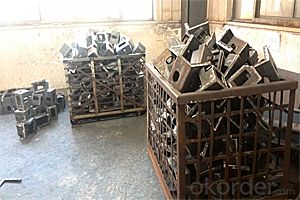
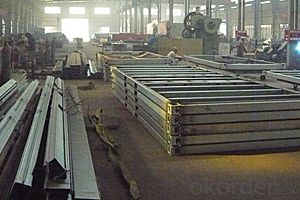
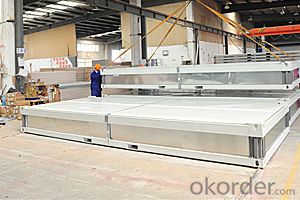
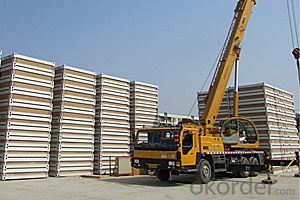
- Q: Are container houses suitable for home offices or workspaces?
- Yes, container houses can be suitable for home offices or workspaces. Container houses are often versatile and can be customized to meet specific needs, making them a great option for creating a dedicated workspace. One of the advantages of container houses is their cost-effectiveness. They are typically cheaper than traditional construction methods, allowing individuals to create a functional workspace without breaking the bank. Additionally, container houses can be easily modified and expanded, providing the flexibility to adapt the space as your needs change over time. Container houses also offer a unique aesthetic appeal. With their industrial and modern look, they can provide a creative and inspiring environment for work. Many container houses are designed with large windows and open floor plans, allowing for ample natural light and creating a comfortable and inviting atmosphere. Furthermore, container houses are highly durable and weather-resistant. They are built to withstand the harshest conditions, making them a reliable choice for a home office or workspace. Additionally, they can be easily insulated and equipped with heating and cooling systems, ensuring a comfortable working environment throughout the year. Container houses also offer the advantage of being easily transportable. If you need to move your workspace to a different location, you can simply transport the container house to your new desired spot. This flexibility allows individuals to work from various locations without the need for major renovations or construction. Overall, container houses can be a practical and efficient solution for home offices or workspaces. Their affordability, versatility, durability, and unique aesthetic make them a suitable choice for those looking for a functional and inspiring workspace.
- Q: Can container houses be designed with a meditation or yoga space?
- Yes, container houses can definitely be designed with a meditation or yoga space. Container houses are highly customizable and can be modified to suit the specific needs and preferences of the inhabitants. With a little creativity and thoughtful design, a container house can easily incorporate a dedicated meditation or yoga space. The key to designing a meditation or yoga space in a container house is to prioritize tranquility, peace, and serenity. This can be achieved by selecting a quiet and secluded area within the container house, away from noise and distractions. A container house can be designed with an open floor plan, which allows for flexibility in creating a designated space for meditation or yoga. This area can be distinguished by the use of different materials, such as bamboo flooring or a soft, soothing color palette. Natural light is also crucial for creating a calming atmosphere. Large windows or skylights can be incorporated into the design to bring in abundant natural light, which is known to enhance the meditation and yoga experience. Additionally, proper ventilation and insulation can ensure a comfortable and refreshing environment for these practices. Storage is another important consideration. A meditation or yoga space will require storage for yoga mats, meditation cushions, and other accessories. Built-in shelves or cabinets can be installed to keep these items organized and easily accessible, while also maximizing the use of space. Lastly, the overall ambiance of the meditation or yoga space can be enhanced by incorporating elements of nature, such as plants or a small indoor fountain. These natural elements can contribute to the calming and grounding effect of the space, allowing for a more immersive and fulfilling meditation or yoga experience. In conclusion, container houses can be uniquely designed to accommodate a meditation or yoga space. With careful planning and attention to detail, it is certainly possible to create a serene and tranquil environment within a container house that promotes relaxation, mindfulness, and spiritual well-being.
- Q: Can container houses be built with a kitchen island or breakfast bar?
- Yes, container houses can be built with a kitchen island or breakfast bar. The modular nature of container construction allows for customization and the inclusion of various amenities, including kitchen islands or breakfast bars, to meet the homeowner's preferences and needs.
- Q: Are container houses suitable for areas with high crime rates?
- Container houses can be suitable for areas with high crime rates, but there are several factors that need to be considered. Firstly, container houses are made of steel, which is a durable material that can withstand break-in attempts. This can be an advantage in areas with high crime rates, as it can provide an added level of security compared to traditional houses made of wood or other materials. Additionally, container houses can be easily modified to include reinforced doors, windows, and other security measures to further enhance their resistance to break-ins. Secondly, container houses can be designed to have fewer access points, making it more difficult for criminals to gain entry. By limiting the number of doors and windows, it reduces the potential weak points that criminals could exploit. This can make it more challenging for them to break into a container house, thus deterring potential criminals. However, it is important to note that container houses alone cannot guarantee safety in areas with high crime rates. It is crucial to consider other security measures, such as installing alarm systems, surveillance cameras, and motion sensor lights, to provide a comprehensive security setup. Additionally, it is advisable to develop good relationships with neighbors and engage in community watch programs to increase the overall security of the area. Ultimately, while container houses can offer certain advantages in terms of security, it is essential to assess the specific circumstances and security needs of the area before determining their suitability. Professional advice from security experts or local law enforcement agencies can provide valuable insights and guidance in making an informed decision.
- Q: Are container houses prone to leaks or water damage?
- Container houses are generally not prone to leaks or water damage if they are properly designed and constructed. With proper insulation and sealing, container houses can effectively keep water out. However, it is important to note that like any other type of construction, the quality of materials and workmanship will play a significant role in preventing leaks and water damage. If the container is not properly sealed or if there are structural issues, such as rust or corrosion, it can lead to potential leaks or water infiltration. Regular maintenance and inspections are essential to ensure the integrity of the container house and prevent water-related issues. Additionally, proper drainage and landscaping around the house can help divert water away from the foundation, reducing the risk of water damage. Overall, with careful planning, appropriate construction techniques, and regular maintenance, container houses can be just as resistant to leaks and water damage as traditional houses.
- Q: How big is the container type?
- First, he is easy to transport, especially for the frequent replacement of the construction unit
- Q: Are container houses suitable for co-working or shared office spaces?
- Container houses can be a suitable option for co-working or shared office spaces, depending on the specific needs and requirements of the individuals or businesses involved. Container houses offer several advantages that make them attractive for such purposes. Firstly, container houses are relatively affordable and cost-effective compared to traditional office spaces. They can be easily converted into functional workspaces at a fraction of the cost of constructing a new building. This affordability can be particularly beneficial for startups, freelancers, or small businesses with limited budgets. Secondly, container houses are highly customizable and flexible. They can be modified and designed to meet the specific needs of a co-working or shared office space. Containers can be stacked, arranged in different layouts, or combined to create larger work areas. This flexibility allows for efficient space utilization and can easily accommodate different work styles and preferences. Additionally, container houses are portable and can be easily moved to different locations, making them suitable for businesses that require flexibility or anticipate relocating in the future. This mobility allows for adapting to changing needs and markets, providing a convenient solution for businesses that may need to shift their operations or expand to new areas. Furthermore, container houses are eco-friendly and sustainable. They are built using recycled materials, reducing waste and contributing to a more sustainable environment. Additionally, container houses can be equipped with energy-efficient systems, such as solar panels or rainwater harvesting, further reducing their environmental impact. However, it is essential to consider certain factors before considering container houses for co-working or shared office spaces. Privacy, noise insulation, and adequate ventilation are crucial aspects to address to ensure a comfortable and productive work environment. Proper insulation and soundproofing measures should be implemented to minimize distractions and create a conducive workspace. In conclusion, container houses can be a suitable option for co-working or shared office spaces due to their affordability, flexibility, portability, and sustainability. However, it is important to carefully plan and address specific requirements to ensure a comfortable and functional workspace for all occupants.
- Q: Are container houses insulated?
- Yes, container houses can be insulated. Insulation is typically added to container houses to regulate temperature, reduce energy consumption, and create a more comfortable living environment.
- Q: How long do container houses typically last?
- Container houses typically last around 25 to 30 years, depending on various factors such as maintenance, location, and quality of construction.
- Q: Are container houses resistant to termites or other wood-damaging pests?
- Container houses are generally resistant to termites and similar pests that damage wood. Unlike traditional wooden houses, container houses are built using steel frames and walls made of non-organic materials like metal or cement boards. These materials are not appealing to termites or other pests that harm wood, which reduces the likelihood of infestations in container houses. Furthermore, container houses can be additionally safeguarded against pests by applying suitable protective coatings or treatments. Overall, container houses provide greater resistance to termites and wood-damaging pests in comparison to conventional wooden structures.
Send your message to us
Container House, Mobile Container house,prefabricated houses
- Loading Port:
- Shanghai
- Payment Terms:
- TT OR LC
- Min Order Qty:
- 4 set
- Supply Capability:
- 200 set/month
OKorder Service Pledge
OKorder Financial Service
Similar products
Hot products
Hot Searches
Related keywords
